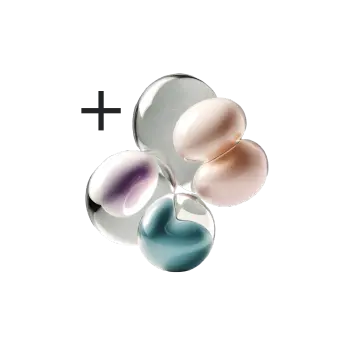Quick version
Are your periods starting to become irregular and your mood swings more than usual? Then it could be perimenopause – the transition to menopause – and not just PMS.
Typical signs of perimenopause:
- Irregular periods
- Hot flashes and night sweats
- Mood swings, fatigue, swelling – these are similar to PMS but occur without you having a clear cycle
Tip: Hormonal contraceptives, such as the pill, can hide the symptoms, but hot flashes are often a clear clue.
Seek help if you: notice new symptoms, feel unwell or want to know more about your hormones. A simple health test can give you answers.
What is PMS and what is perimenopause?
PMS stands for premenstrual syndrome and is a collective name for both psychological and physical symptoms that we experience one to two weeks before menstruation or within a few days after. Perimenopause is the transitional period leading up to menopause. It can start as early as the late 30s, but most commonly it starts between the ages of 40 and 45. During this time, estrogen levels in the body begin to fluctuate more than before – sometimes significantly – which affects the menstrual cycle and many physical and emotional functions.
Here you can read more about, and see, how hormones change during the transition to and in menopause.
The difference between PMS and perimenopause
Many of the symptoms overlap between PMS and perimenopause, which can make it difficult to know which is which. Here are some examples of what you may experience during both conditions:
- Mood swings
- Anxiety or depression
- Irritability
- Swelling and fluid retention
- Stomach discomfort such as constipation or diarrhea
- Breast tenderness
- Weight gain
- Fatigue and headaches
- Joint pain
But while PMS, or premenstrual syndrome, follows a relatively regular cycle, perimenopause is characterized by irregularity. During perimenopause, periods can come more frequently, less frequently, skip a month – or suddenly become very heavy or scanty.
Hot flashes – a clear sign of perimenopause
One of the clearest signs that it is perimenopause – and not “just” PMS – are so-called vasomotor symptoms, such as:
- Hot flashes
- Night sweats
These two symptoms are strongly linked to falling estrogen levels and almost never occur in regular PMS. If you are experiencing these symptoms and are in your 40s or 50s, it is very possible that you are in the early stages of menopause.
Hormonal contraceptives can mask symptoms
It may be more difficult to detect early signs of perimenopause when using hormonal contraceptives because the hormones that are administered can both dampen and mask the natural hormonal fluctuations that occur in the body. But even then, hot flashes or night sweats can be a clue.
When should you seek medical attention?
It is always wise to talk to a doctor if you notice new or changing symptoms. Partly to rule out other conditions, but also to get advice on:
- Hormone treatment or other medical options
- Lifestyle changes that can relieve the symptoms
- Dietary supplements or herbal remedies
- Managing stress and sleep problems
Get a handle on your hormones - order a health test
We have a wide range for those of you who want to gain insight into your hormonal values, put together your own referral for, for example, estradiol, progesterone, follicle-stimulating hormone and luteinizing hormone or order one of our ready-made health test packages below.





























